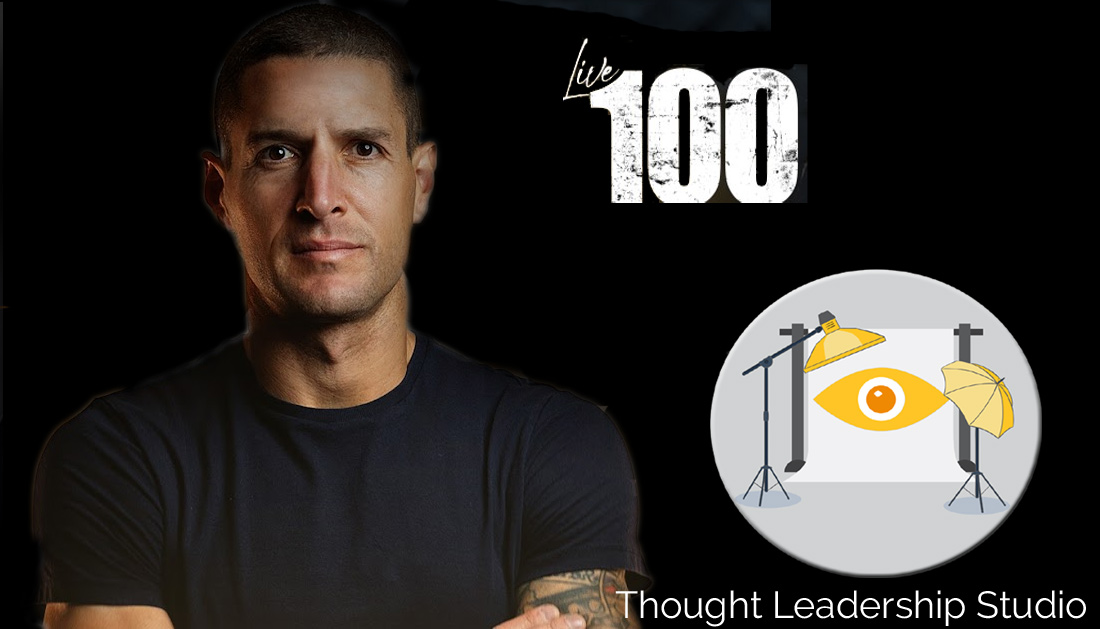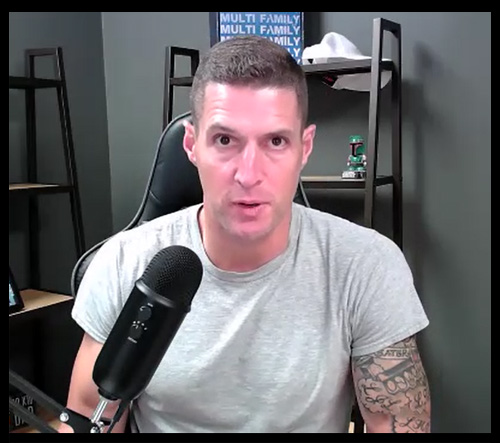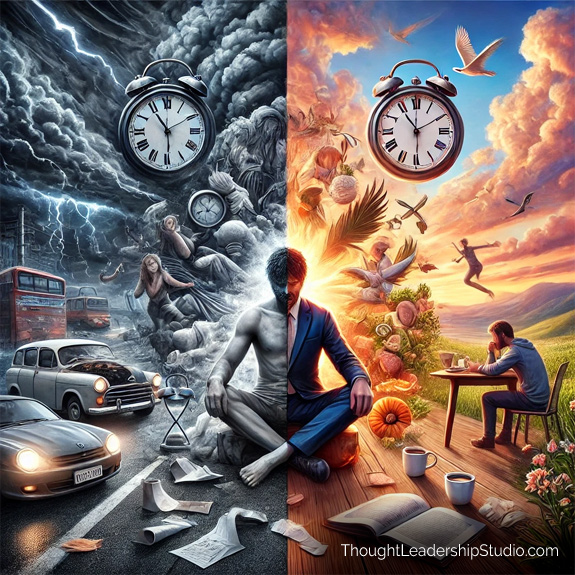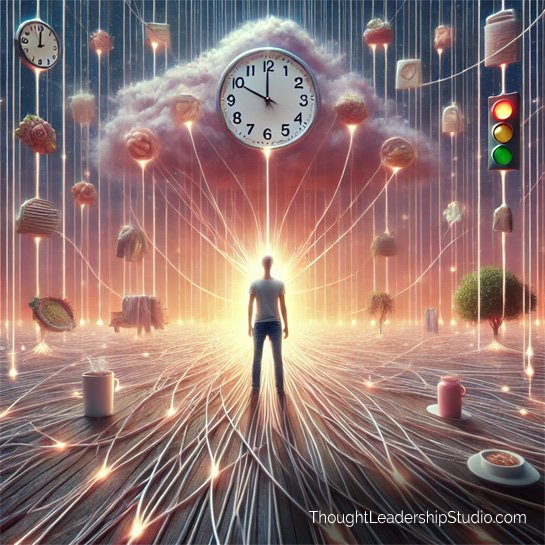Thought Leadership Studio Podcast Episodes:
Self-Mastery and Business Success with Jason Yarusi
Episode 80 - Harnessing the Power of Routines, Mental Clarity, and Focus to Elevate Personal and Professional Growth

#coaching, #entrepreneurship, #interview, #interviews, #leadership, #lifebalance, #mentaltraining, #motivation, #personalbranding, #strategicthoughtleadership, #thoughtleadership
Or Click here to listen or subscribe on appWhat this episode will do for you
:- Jason Yarusi's Journey to Self-Mastery: Explore Jason's transformation from transactional tasks to a focus on the bigger picture in real estate investment and personal development.
- The Role of Self-Mastery in Business Success: Understand how mastering oneself can lead to greater business achievements and a more balanced life.
- Creating Effective Routines: Learn about the significance of daily routines and workouts in maintaining mental clarity and conserving energy for crucial decisions.
- Strategies for Overcoming Setbacks: Gain insights from Jason on the importance of learning from failures and how they can be leveraged for growth.
- Controlling Your Focus in Business: Discover Jason’s advice on narrowing your focus while strategically expanding into related business areas.
Jason Yarusi.
In this episode, I’m excited to introduce Jason Yarusi, a multifaceted expert in multifamily real estate investment and self-mastery coaching.
How does self-mastery relate to Strategic Thought Leadership (STL)?
Strategic Thought Leadership is about harnessing the power of influence to inspire and lead. In the context of personal and business success, this depends on mastering oneself by aligning mind, body, and actions to achieve the clarity and impact necessary to build an audience and lead it to a fresh perspective.
Jason Yarusi, a seasoned real estate investor and dynamic coach, believes that self-mastery is the cornerstone of success in any field. His journey from tackling transactional tasks to focusing on the bigger picture has shaped his philosophy: by mastering yourself, you can master your business and your life.
In our conversation, Jason shares his insights on the crucial role of routines, the power of workouts, and the importance of conserving mental energy. He emphasizes being present in the moment and learning from failures as key components of becoming the best version of oneself.
We also delve into how his coaching philosophy encourages entrepreneurs and thought leaders to narrow their focus while expanding into related businesses. Jason concludes the interview with three actionable recommendations for those looking to elevate their personal and professional lives.
Some of Jason's coordinates:
Curated Transcript of Interview with Jason Yarusi
The following partial transcript is lightly edited for clarity - the full interview is on audio. Click here to listen.
Chris McNeil: I'm Chris McNeil, with Thought Leadership Studio, and I'm sitting across Zoom with Jason Yarusi, who is the dynamic creator of Live 100.
Jason's mission is to help you implement his a hundred mile roadmap into your life and business with practical, actionable advice you can use right now if you're tired of not feeling fit, lacking focus, or not having the financial resources to achieve your goals. Jason's insights will be invaluable.
He specializes in helping break habits that no longer serve you, empowering you to build momentum and reach the levels of success you deserve. And Jason's not just a thought leader and coach, but also a private fund manager overseeing more than 300 million in commercial real estate. He's an avid ultra marathon runner that's impressive, founder of multiple successful businesses and a dedicated father and husband. Welcome Jason.
 Jason Yarusi: It's great to be here.
Jason Yarusi: It's great to be here.
Chris McNeil: Great to have you here. So to give our listener who may not already be familiar with your work a little bit of context ... and frame where we can go with this interview, I see two threads here, two major threads in your background, the multifamily real estate investment and the self-actualization, self-mastery type coaching that you do.
Which came first and how did one lead to the other ... or how did it work out for you to be on the path you're on now?
Navigating Life’s Challenges: Turning Adversity into Opportunity
Jason Yarusi: I think a lot of it ties into me making corrections in my mind and my life first, which led me into choosing to do different things with my life and so different careers, different outlooks, and that led me into buying large apartment buildings. From there, that transitioned me to helping others really through the path for them to help within self-improvement.
I grew up in New Jersey and during my formative years I faced a lot of loss. I was at 13. I had a friend who was killed in a boating accident and then when I was 14, had a friend get in a car with a bunch of people that were doing drugs and alcohol and got in an accident and got killed. And when I was 15, I had a friend who was down the street from me, just really good friend, known forever, just really happy kid, blew his head off with a shotgun and then got to 17 and I had a girlfriend that I was really closed in.
I was shy, I was introverted. I had a girlfriend who I could talk to I could really open up to. And unfortunately she got in a car with a bunch of friends. They were going on the beach, just had gotten driver's license and she was killed. The only one killed in a car accident. So I left high school, just really lost in this part where just my parents had a small business that struggled a lot, so they were facing her own internal challenges and demons. And my dad was really closed off as well.
So I went to college. Honestly, on a whim, someone came and saw me play football. He said, you come to this school and I didn't even know what I agreed to go to college without even knowing what state the school was in. It was like those kind of choices I was making was that I was just choosing basically ad hoc at everything there because I just didn't feel motivated and feel confident and I just felt like everything could just easily get pulled away from me.
Well ended up getting a finance degree in school because at the time, again, I had a friend's mom say, you should do business, you're good with numbers. And so I got a finance degree. Well, I leave school and I'm just not happy with any my choices and I didn't want to go into finance. I didn't want to go do anything within in terms of that realm. So I moved to New York City and I started working as a bartender.
So I was just doing things that just weren't really in any linear path. I was just taking jobs because I just wasn't confident in myself. I just wasn't really feeling prepared. I just wasn't happy with really the circumstances. And I did that for a couple years and one night I'm just mad at the universe. I'm mad at the world and just mad at everybody. If you were there, I'd be mad at you just for anything that was happening in my life.
 I was blaming outwards and got on my bike 2:33 in the morning riding home from this bar riding across Manhattan, and I turned right down second Avenue and out of nowhere a flashlight came out. And next thing I know, I'm flying in the air because a car had hit me on my bike. And I come to, I get up and get pulled out of the street.
I was blaming outwards and got on my bike 2:33 in the morning riding home from this bar riding across Manhattan, and I turned right down second Avenue and out of nowhere a flashlight came out. And next thing I know, I'm flying in the air because a car had hit me on my bike. And I come to, I get up and get pulled out of the street.
An ambulance comes and I get taken to the hospital and it turns out I get some stitches in my chin, my head, I get some broken bones, a pin in my wrist, and I'm just sitting there and I get released from the hospital and all I had in my mind was like, wow, I need to get back to work because I need to make money to make rent. And there was this moment of pause where I was like, okay, so you have been so angry about your position in life, all the things you're doing.
You hate your job, you hate where you're at, and now you get run over by a car, you're all beat up and all you can think about is getting back to the life that you don't want to be in. So hold on here either you have to stop being upset with your direction of life because if you're going to continue to make chaotic choices, you're going to continue to get chaotic results. You need to be okay with that, just move on or something has to change.
And it wasn't overnight, but little by little I started to make some little changes, some little course corrections in my day. So get up earlier, start to have some actionable things I would do through day start to get on a workout plan, start not staying up so late, not drinking at the end the shift. Then lo and behold, they started to create some momentum in a positive fashion, for instance, and it starts to build confidence.
And from there, I left the bar world to actually open my own restaurant and bar in New York City. I opened a brewery that I sold in New York City and then I moved out to New Jersey because just like you said, you're having a storm here. Hurricane Sandy happened on the east coast over a decade ago, and that decimated the East coast.
Well, lo and behold, my dad's struggling business, did a ton of work for lifting homes, that's what he had done for years. And his business went from a couple projects a year to just thousands of calls a day. It was insanity. And so my little brother, my now wife, my girlfriend at the time myself, we went out and helped dad take his family business, take this small business from 10, 12 jobs a year to over 250 jobs a year. And it was fun.
It was good. A lot of tension when you're working a bunch of Italians all in one family, a lot of conflict. But it helped me continue to just learn how to build momentum, learn how to face adversity, learn how to do things that you can grow businesses. But I kept asking the question of what could I do to continue to one, gain traction but get back control of my life? Because remember, I was working in bars where the pace dictates you if customers come in or out or their experience, and it was all transactional to go and get construction, continue to be very transactional.
And what we did is we started to move into real estate projects. We started to actually buy homes and flip homes, and that was fine for the time, but again, another transactional thing. And lo and behold, one day my wife is still, my girlfriend at the time met someone who was buying basically apartments out of the state.
They were buying 'em in other states and putting together a process and putting together teams. And that was that light bulb moment where I was like, I understand this. I understand here where it takes me out of the part of doing all the transactional things, running to Home Depot or meeting with the customer, going to lease a unit or just being the middleman, but also the thing that was really stopping the momentum.
Well, I was able to pull myself out of it, learn the process. And in 2017, we brought an apartment community in Louisville, Kentucky, and that was the first of over 30 of these transactions. Now to date that we've brought a little over 3000 units across seven states.
Chris McNeil: I love that. One piece of it I'm getting is that tragedy, that accident, having lost all the friends, that's kind of life saying something needs to change or showing you something needs to change.
And the other thing I'm picking up as a really powerful thread is it looks to me from here like you associate self-mastery with business success: being fit of mind, body, emotions. I've seen some of that in your Live 100 on your video channel as well on YouTube, which is excellent by the way, very motivating.
Self-Mastery and Business Success: Starting the Day Right
How do you see the relationship of personal self-mastery and business success?
Jason Yarusi: You have to tie both together in a way here because ultimately at some part there's going to be your relationships, there's going to be your health, there's going to be your finances, and there's going to be where you spend a lot of your time, which for most of us is our business. So we have to be mentally prepared to show up, to be disciplined to the actions, to really get the results.
Because what happens in businesses a lot is that you can do everything perfect and still have five wild cars that come out of left field that we can just blow up your day. And if you're not mentally stable or confident, you're on a roller coaster ride constantly just not understanding that. That's just part of the process. And I've put a lot of focus on controlling my morning, controlling my day to just have almost a certainty of execution.
 So I'll get up, have a glass of water, I'll meditate, I'll work out, I'll spend time with my family, I'll get the kids, take them to school, take them to their school. And so I've had those wins. I've had those parts where I know that I've already, I can check that offer today. So the second that I walk into the office, if things go great, perfect, but usually there's some wild card out there that just blows up in the day that you have to deal with.
So I'll get up, have a glass of water, I'll meditate, I'll work out, I'll spend time with my family, I'll get the kids, take them to school, take them to their school. And so I've had those wins. I've had those parts where I know that I've already, I can check that offer today. So the second that I walk into the office, if things go great, perfect, but usually there's some wild card out there that just blows up in the day that you have to deal with.
But if I started my day in a chaotic way and I started there, I woke up late, I was rushing to work, maybe I get stuck in traffic. I eat something poorly. I don't take time for myself. Maybe I'm short my kids because they're running late for school, and then I walk into all these fires at work.
I'm constantly at RPM 7,000 and I'm never having some moment of relaxation where I can come in there confident to be able to deal with things that come up in the moment instead of reacting. Most of us, we react. All we do is react all day because we're never controlling any part of ourselves.
So as everything comes up, we're just reacting, right? That's why we're getting mad at people when they cut us off. That's why you get mad at the waiter when they bring the wrong order. That's why you're mad in a phone call. You're just mad at your wife or your kids. It's not them. It's just how we're showing up within ourself to each and every event.
Chris McNeil: I love that. So starting the morning with a routine that builds confidence in your ability to control your life, helps you be ready for these wild spins we all get thrown at us in business. I mean, how can you predict everything that's going to come up?
But there are things you can predict. There are things you can take control of and you can tune yourself to be a high performance machine, so to speak. Does that jive with what your philosophy is? Is that making sense?
Maximizing Mental Bandwidth: Eliminating Decision Fatigue
Jason Yarusi: What I try to do is eliminate unneeded decisions, right? Because what we're doing is you think it's something like 65,000, 80 thoughts a day for which 80% of them are repeated day in and day out. And if everything is a decision, then we can't spend our time making important decisions. So think about this.
If you wake up in the morning and everything is like, well, what time should I get up tomorrow? Or should I get up now? Or, oh, should I go out to eat or should I make breakfast at home? Or what should I wear today? These are all things that we have to spend our brain power on. And so by the time we actually get to the things that need important decisions, need us to be fully focused, we're already tired, we're already expended because we've made so many decisions. And usually what that means is either we'll make a very rash or rush decision or we'll put it off.
 So we will put off that important thing because it takes too much brainpower. So if we spend all these days, and something important today would be like, oh, I have to call this customer, right? I'm trying to make a sale. I have to call this customer. But you've had a really rough morning. You didn't get up in time, you didn't get workout, you just were stuck in traffic.
So we will put off that important thing because it takes too much brainpower. So if we spend all these days, and something important today would be like, oh, I have to call this customer, right? I'm trying to make a sale. I have to call this customer. But you've had a really rough morning. You didn't get up in time, you didn't get workout, you just were stuck in traffic.
You ate something poor. You're up drinking the night before and now you're here like, oh, I really don't feel like I'll just do this tomorrow. And if you do that enough and enough and enough, you never actually execute on what's important in your life. The more you can control things and just take that energy back because today I wake up, I'm going to wear jeans and a T-shirt to work. Boom, okay, I'm going to work out.
Boom, I'm going to have a glass of water. Boom, I'm going to make coffee. Boom, I'm going to take my kids to school done, and I'm at the office done. I don't have to make all they're already made and is every day perfect? No, but if you can have it in your mind where you're getting nine out of 10 or you're getting eight out of 10 of those points, you now have all that energy back that you can use that energy proactively and other things that can help grow you to a better life, to a better outcome.
Chris McNeil: That's excellent. It seems like there's getting a handle too on conserving bandwidth. That part of it is. So you're not bleeding off mental energy from you say doing things that expend energy, staying out late, getting off your routine, missing your workout. How essential are workouts to state of mind for you?
Jason Yarusi: For me, very because it just helps me get, we'll say my baseline to get my baseline of where it is. I get there and it's part of my day, and so it's something that's a normal in my day. So without it, now my mind's been trained that something's off if I don't have it done.
And so it gets to the part where it's on the back of my mind is that you haven't completed part of your important steps of your day because you haven't done it. So I use it as a very big advantage to get set and get my composure down and spend that energy so I can now be focused on other things going forward.
Mastering the Art of Showing Up
Chris McNeil: Yeah, that's awesome. And to the listener, I think all this is extremely relevant to the things we do in Thought Leadership, in Strategic Thought Leadership because you can have external Thought Leadership and having the right media and having the right message out there and having the promotion. But if you're not also working on inner Strategic Thought Leadership on the self-mastery aspects on tuning yourself as a high performance machine, then you're just leaving a lot on the table.
I think those have to be concurrent paths. So it's great to meet someone like you, Jason, who sees the relationship between self-mastery and how we express it in our habits, whether those are habits that renew us or habits that drain us, and taking control of your mental bandwidth. So you have that bandwidth when things come up and you're ready to handle those.
Jason Yarusi: It gives you confidence, right? Many times it's that we're waiting to be confident, we're waiting for the confidence to show up, but confidence doesn't just show up. It comes from us doing things and they're not always perfect, but we do something and maybe it doesn't go well, so the next time we do a little bit better, but we just keep showing up and that builds confidence.
 That allows us to be more present in the moment and to continue to carry forward for other things. Many times we do it in reverse where we're like, I just don't feel confident. Well, you haven't tried, right? You have to try and then get a little bit further from where you are closer to where you want to be, and that's where you build the confidence.
That allows us to be more present in the moment and to continue to carry forward for other things. Many times we do it in reverse where we're like, I just don't feel confident. Well, you haven't tried, right? You have to try and then get a little bit further from where you are closer to where you want to be, and that's where you build the confidence.
Chris McNeil: Absolutely. Go achieve something, take a step in their direction, it's measurable, get some feedback that what you're doing is working. So you do coaching and speaking, is that correct?
Jason Yarusi: I do.
Chris McNeil: And you speak from this platform of the Live 100. Can you give our listener a synopsis of what you mean by Live 100?
Jason Yarusi: I was able to break my pattern. So I gave you a brief part of my story earlier on, and as part of that story, I went from very shy. I remember I just had no confidence, really just didn't want to step outside or put myself out there to just saying I have to make change. And for that, I slowly started to break habits that didn't serve me anymore.
And it doesn't always have to be bad habits. So when people think habits, they think, oh, it must've been horrible. Well, yes, some things were bad habits, but you also have good habits that get you to a certain part of your life, and sometimes you have to change those habits to just tweak those habits to be better habits for you to grow to the next level. So it's for me, breaking the habits so to putting them into better habits in my life so I can start to build momentum to be able to magnify my future.
And that's really the live 100 message, and it is across nine pillars. And really one of the pinnacle pillars is just being self-aware of how you're showing up. So many times we're walking around here, but we're not truly truly looking at ourselves because we're always looking outwards, but it's hard for us to really turn the finger back and understand how we're showing up.
Are we constantly showing up nervous? Are we constantly coming here in fear? Are we walking the door just always angry? How are we showing up in the moment? How are we reacting in our relationships? How are we reacting in times of need? How are we coming into our job? How are we showing up? And the more we can be self-aware of how we're presenting ourself, then we can own it, right? We say, okay, listen, I'm really scared right now. Really scared about all these things around here.
Okay, I understand that and I own that, but now how can I position myself to improve? How can I position myself for greatness? Because once I start understanding how I'm showing up, I can start looking at, okay, how can I position myself for a better future? And when I see that, I can start to learn the habits I need and start working to master habits because then my growth accelerates when I start to say, okay, this is where I am.
This is my starting line, which is fine if it's I have $10 in the bank account and I just got fired from my job and I'm on the verge of leaving my house. It's not always the perfect point for anyone, but that's your starting point. We have to acknowledge that so we can own it and we can say, okay, this what's got me there now for the person I want to be that's out there in the universe.
How does that person show up in each day and how can I start positioning myself to become that person? So as I start taking new steps, they might not always be the perfect step, but at least they're going to be in a general correct direction. I can start to learn from so many times in life, it's like we put our hands on the stove and we get burnt, and then the next day we just do it again.
And that's how we treat our life. Instead of just saying, okay, that was definitely not the right move. How can I learn from that? How can I learn from that and improve myself so I can start growing to become the person I deserve to be?
***************************************
The transcript is lightly edited for clarity and is a partial transcript- the full interview is on audio. Click here to listen.
***************************************
Free Stuff and Offers Mentioned in Podcast
***************************************
***************************************